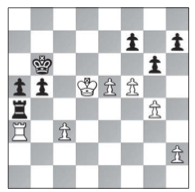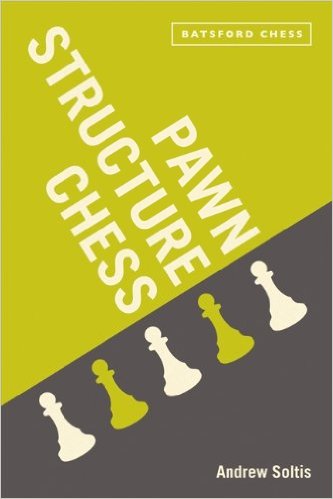TITLE: Search, Abstractions, and Big Epistemological Questions
AUTHOR: Eugene Wallingford
DATE: September 11, 2015 3:55 PM
DESC:
-----
BODY:
Andy Soltis is an American grandmaster who writes a monthly
column for Chess Life called "Chess to Enjoy". He
has also written several good books, both recreational and
educational. In his August 2015 column, Soltis talks about
a couple of odd ways in which computers interact with humans
in the chess world, ways that raise bigger questions about
teaching and the nature of knowledge.
As most people know, computer programs -- even commodity
programs one can buy at the store -- now play chess better
than the best human players. Less than twenty years ago,
Deep Blue
first defeated world champion Garry Kasparov in a single
game. A year later, Deep Blue defeated Kasparov in a closely
contested six-game match. By 2005, computers were crushing
Top Ten players with regularity. These days, world champion
Magnus Larson is no match for his chess computer.
Yet there are still moments where humans shine through. Soltis
opens with a story in which two GMs were playing a game the
computers thought Black was winning, when suddenly Black
resigned. Surprised journalists asked the winner, GM Vassily
Ivanchuk, what had happened. It was easy, he said: it only
looked like Black was winning. Well beyond the computers'
search limits, it was White that had a textbook win.
How could the human players see this? Were they searching
deeper than the computers? No. They understood the position
at a higher level, using abstractions such as "being in the
square" and passed pawns like splitting a King like "pants".
(We chessplayers are an odd lot.)
When you can define 'flexibility' in 12 bits,
it will go into the program.
Attempts to program computers to play chess using such abstract
ideas did not work all that well. Concepts like king safety
and piece activity proved difficult to implement in code, but
eventually found their way into the programs. More abstract
concepts like "flexibility", "initiative", and "harmony" have
proven all but impossible to implement. Chess programs got
better -- quickly -- when two things happened: (1) programmers
began to focus on search, implementing metrics that could be
applied rapidly to millions of positions, and (2) computer
chips got much, much faster.
The result is that chess programs can beat us by seeing farther
down the tree of possibilities than we do. They make moves
that surprise us, puzzle us, and even offend our sense of
beauty: "Fischer or Tal would have played this move;
it is much more elegant." But they win, easily -- except when
they don't. Then we explain why, using ideas that express an
understanding of the game that even the best chessplaying
computers don't seem to have.
This points out one of the odd ways computers relate to us in
the world of chess. Chess computers crush us all, including
grandmasters, using moves we wouldn't make and many of us do
not understand. But good chessplayers do understand
why moves are good or bad, once they figure it out. As Soltis
says:
And we can put the explanation in words. This is why chess
teaching is changing in the computer age. A good coach has
to be a good translator. His students can get their machine
to tell them the best move in any position, but they need
words to make sense of it.
Teaching computer science at the university is affected by
a similar phenomenon. My students can find on the web code
samples to solve any problem they have, but they don't always
understand them. This problem existed in the age of the book,
too, but the web makes available so much material, often
undifferentiated and unexplained, so, so quickly.
The inverse of computers making good moves we don't understand
brings with it another oddity, one that plays to a different
side of our egos. When a chess computer loses -- gasp! -- or
fails to understand why a human-selected move is better than
the moves it recommends, we explain it using words that make
sense of human move. These are, of course, the same words and
concepts that fail us most of the time when we are looking for
a move to beat the infernal machine. Confirmation bias lives
on.
Soltis doesn't stop here, though. He realizes that this
strange split raises a deeper question:
Maybe it's one that only philosophers care about, but I'll
ask it anyway:
Are concepts like "flexibility" real? Or are they just
artificial constructs, created by and suitable only for
feeble, carbon-based minds?
(Philosophers are not the only ones who care. I do. But
then, the epistemology course I took in grad school remains
one of my two favorite courses ever. The second was cognitive
psychology.)
We can implement some of our ideas about chess in programs,
and those ideas have helped us create machines we can no
longer defeat over the board. But maybe some of our concepts
are simply be fictions, "just so" stories we tell ourselves
when we feel the need to understand something we really don't.
I don't think so, the pragmatist in me keeps pushing for
better evidence.
Back when I did research in artificial intelligence, I always
chafed at the idea of neural networks. They seemed to be a
fine model of how our brains worked at the lowest level, but
the results they gave did not satisfy me. I couldn't ask
them "why?" and receive an answer at the conceptual level at
which we humans seem to live. I could not have a conversation
with them in words that helped me understand their solutions,
or their failures.
Now we live in a world of "deep learning", in which Google
Translate can do a dandy job of translating a foreign phrase
for me but never tell me why it is right, or explain the
subtleties of choosing one word instead of another. Add more
data, and it translates even better. But I still want the
sort of explanation that Ivanchuk gave about his win or the
sort of story Soltis can tell about why a computer program
only drew a game because it saddled itself with inflexible
pawn structure.
Perhaps we have reached the limits of my rationality. More
likely, though, is that we will keep pushing forward, bringing
more human concepts and abstractions within the bounds of what
programs can represent, do, and say. Researchers like
Douglas Hofstadter
continue the search, and I'm glad. There are still plenty of
important questions to ask about the nature of knowledge, and
computer science is right in the middle of asking and answering
them.
~~~~
IMAGE 1. The critical position in Ivanchuk-Jobava, Wijk aan
Zee 2015, the game to which Soltis refers in his
story. Source:
Chess Life,
August 2015, Page 17.
IMAGE 2. The cover of Andy Soltis's classic Pawn
Structure Chess. Source: the book's page at
Amazon.com.
IMAGE 3. A bust of Aristotle, who confronted Plato's ideas
about the nature of ideals. Source:
Classical Wisdom Weekly.
-----



